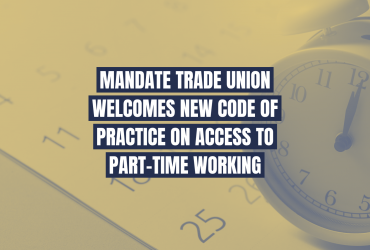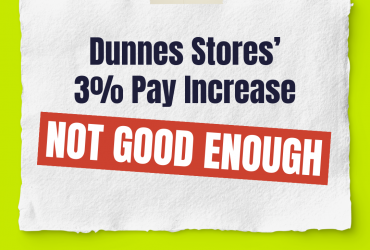Mandate Trade Union says 10c minimum wage increase is an insult to low-paid workers
Tuesday 19 July 2016Mandate, the retail and bar workers’ union, has strongly condemned the Low Pay Commission’s recommended 10 cent per hour increase in the minimum wage saying it is an insult to low-paid workers and the most vulnerable in our society.
More than 70,000 workers depend on the minimum wage to ensure a basic standard of living for them and their families, but have been badly let down by this recommendation. The current minimum wage is €9.15 per hour which would increase by 1.09% to €9.25 if accepted by government.
“No matter what way you look at this recommendation, it falls well short of what is needed to ensure that work pays and that poverty levels are tackled,” said John Douglas, Mandate General Secretary.
“When this proposed increase is compared with the Living Wage, the median wage or the 26% growth and ‘recovery’ Ireland is apparently experiencing, it shows that low-paid workers are being left behind.”
Mr Douglas continued, “The current Programme for Government clearly states that it supports reducing poverty levels by increasing the minimum wage to €10.50 over the next five years. At the rate that the Low Pay Commission has recommended, it would take 13 years to achieve that target, not taking into account inflation over that period. This illustrates the commitment the Low Pay Commission has towards tackling poverty.”
The recommendation by the Low Pay Commission would see a minimum wage worker earning an extra €3.91 per week if they are receiving full time work. However, combined with the government’s deferral of addressing the exploitation of zero and low hour contracts this month, the recommendation will do very little to help low paid workers.
“The Living Wage is currently set at €11.50 per hour. At this rate, it’ll take 23 years for a minimum wage worker to achieve a basic living standard – and that’s if the cost of living doesn’t go up one cent in that period of time,” said Mr Douglas.
“At a time when workers represented by trade unions in the retail sector are achieving pay increases of between 2-3%, along with secure hour contracts, this is evidence, if needed, that you cannot rely on government or a commission to award you a decent pay increase. Your best way to secure decent pay and working conditions is by joining a union.”
Mr Douglas addressed criticisms of employers’ representatives to the minimum wage increases saying they’ve always been against low paid workers improving their living standards.
“Yet again we have employers’ bodies complaining about a measly 10c increase in the minimum wage as if it is going to shut down businesses all over the country. With a straight face they’re using small and medium enterprises as an example of the impending employment apocalypse, saying they cannot afford a 1% pay increase and will have to shut down. This irresponsible posturing is nonsense. If employers have a genuine concern about their business, they can plead inability to pay which is provided for under the legislation.”
Mr Douglas explained, “The reality is, Irish workers are underpaid by comparison with their EU counterparts and we needed a much higher increase in the minimum wage in order to catch up. As usual, employers are comparing headline minimum wage figures with other EU countries and ignoring the low employers’ social insurance rates afforded to Irish businesses, which is obviously not comparing like with like.”
Mr Douglas cited some facts for employers’ representatives to dwell on from Unite the Union’s report on low pay:
- Ireland has the highest proportion of low pay in the EU15
- Almost 1 in 4 workers in the Irish economy are classified as low paid.
- Retail workers in Ireland would need an 18% pay increase to reach the average retail worker in the EU15.
- Workers in accommodation, food and services would need a 35.5% increase to reach the average small open economy in Europe.
- Of all of those at risk of poverty, 12% are at work.






